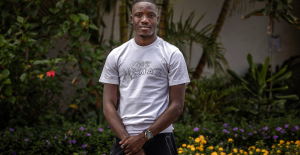Despite the loss of votes in Lower Saxony, FDP leader Christian Lindner has committed himself to the federal traffic light coalition. "We are in an energy war and an economic crisis," said the Federal Minister of Finance on ZDF. “We are responsible for this country. I swore an oath of office.” The FDP is aware of its responsibility for the country and its people.
The election result of his party in Lower Saxony is also due to the participation in the traffic light coalition. The FDP could not give their campaigners from Berlin any tailwind, said Lindner. "Because many of our supporters are strangers to this coalition."
Lindner described the poor performance in the election as a "setback for the FDP". "We wanted the politics of the center to be strengthened," he said. "In Hanover it now looks like a left-wing majority." According to projections by ARD and ZDF, the FDP only got five percent in Lower Saxony on Sunday and had to worry about being able to re-enter the state parliament in the evening.
After its poor performance in Lower Saxony, the FDP wants to make a stronger impression in the federal traffic light coalition. "The role and voice of the FDP in this coalition must be even more clearly recognizable in the future than it has been up to now," stressed General Secretary Bijan Djir-Sarai on ARD's "Berliner Runde". The traffic light coalition must talk, dealing with each other does not go on like this.
Specifically, Djir-Sarai called the dispute over the debt brake. "A coalition will not work if two partners are constantly coming up with ideas on how to spend even more money and even more money and others have to constantly deal with the question of how to organize and finance the whole thing," he emphasized. "In my view, for example, it will no longer work that way." The FDP still has "big problems with this coalition".
Deputy CDU chairman Carsten Linnemann sees no mistakes by party leader Friedrich Merz in the Lower Saxony state election campaign. "If Friedrich Merz hadn't been so committed, in my opinion, the result would have been worse," he said, referring to the CDU defeat in the state elections. In times of crisis, people vote for those in power. "Mr. Weil played this official bonus to the fullest, so congratulations."
Lower Saxony's CDU parliamentary group leader Dirk Toepffer announced his resignation after his party's defeat in the state elections. This was confirmed by a group spokesman for the German Press Agency. "It was not possible to create a mood of change in Lower Saxony," Toepffer had previously told the "Hannoversche Allgemeine Zeitung". The 57-year-old entered the state parliament for the first time in 2008 and has been chairman of the CDU parliamentary group since 2017.
Green leader Ricarda Lang is counting on a continuation of the coalition of SPD, FDP and their party in Berlin. "The traffic light bears a huge responsibility at this time," she said on ZDF. "We have to get people through the winter by capping gas prices now, by ensuring security of supply." At the same time, we must keep looking ahead in order to expand renewable energies and get the climate crisis under control. "We are all still ready for this," said Lang.
SPD leader Lars Klingbeil expects a red-green coalition in Lower Saxony after the state elections. This decision will not be made in the federal government, but in the state, he emphasized in Berlin. But it will probably be enough for such a government by the SPD and the Greens. "And then, I'm sure, there will be this government coalition, which has worked together very successfully in Lower Saxony for a long time, then it will now exist again," said Klingbeil, who himself comes from Lower Saxony.
Lower Saxony's Prime Minister Stephan Weil (SPD) sees a clear government mandate for himself. "The voters have given the SPD the government mandate and no one else," said Weil in Hanover at his party's election party. He now wants to wait until the evening of the election to see whether it will be enough for his desired coalition with the Greens. First projections see a majority for this alliance.
Despite the SPD's loss of votes compared to the 2017 state election, the Prime Minister said: "We are strengthened." The conditions are completely different from the election at the time, given the difficult political environment with an energy crisis and high inflation. That is why the result achieved is “a great success”.
Despite election forecasts of around five percent, FDP top candidate Stefan Birkner has shown himself confident that his party will be able to re-enter the state parliament. "Of course we are confident and assume that we will belong to the Lower Saxony state parliament," said Birkner at his party's election party.
Lower Saxony's AfD state chairman Frank Rinck described his party's departure as a clear electoral success. The AfD almost doubled its election results, Rinck said on NDR television. “It has little to do with protest. It has to do with the fact that people no longer want this type of politics. The people in our country want a policy that brings security of supply, that brings energy security, and that was not the case with the old parties.” According to projections, the AfD was able to improve its result from 6.2 to over 11 percent.
After the defeat in the state elections, the CDU state chairman and top candidate Bernd Althusmann announced his resignation. Althusmann said in Hanover that he would inform the state board on Monday that he was no longer available as state head. "That is my personal consequence of the election result." The CDU did not achieve its election goal of becoming the strongest force. "We humbly accept this vote." Althusmann wished "the prospective Prime Minister Stephan Weil" every success.
FDP party leader Christian Lindner spoke of a "sad evening". The Liberals had "suffered a political setback," said Lindner at the Berlin party headquarters. The aim in Lower Saxony was to prevent a leftward slide, but this was unsuccessful. It was not possible to organize a political tailwind from Berlin. Nevertheless, the FDP is sticking to its demand to pursue an ideology-free energy policy, said Lindner with a view to the Liberals' demand to keep more nuclear power plants connected to the grid longer.
Federal Minister of Agriculture Cem Özdemir is critical of the AfD's strong increase in votes in Lower Saxony. The losses of the other parties and the "win for Putin fans are worrying," tweeted the Green. With a view to a possible red-green state government in Hanover, however, he also emphasizes: “Government with good politics for the state and city
The Lower Saxony Green Party top candidate Julia Willie Hamburg was delighted to thank the voters. Her party will probably have the best result she has ever achieved in an election in Lower Saxony, she said at the Greens' election party. "We are very pleased. We are really happy.” The voters have shown that they want the Greens to take responsibility. "And that's what we're going to do now. We will do everything we can to reshape Lower Saxony as a Green for the next five years and make it fit for the future.”
Labor and Social Affairs Minister Hubertus Heil (SPD) derived a preference for the formation of a red-green coalition in Hanover from the first projection. "It's a strong government order for Stephan Weil," said Heil on ZDF. Since it is also about making Lower Saxony the "number one energy state" in Germany, the Greens are a better partner than the CDU. "We saw that the CDU was more of a brake than an engine of progress," said Heil.
Lower Saxony's Health Minister Daniela Behrens (SPD) rated the result of the state election as an election victory for her party. "The strongest force in Lower Saxony is and remains the SPD and that's a reason to celebrate," said Behrens on NDR television. The election campaign was less about national issues and more about increased energy costs and inflation. But it is important to give reliable answers. "And I think we as the SPD were able to radiate this reliability and seriousness well because we said what we wanted."
Lower Saxony's Interior Minister Boris Pistorius has spoken out in favor of a red-green alliance in Hanover. "Let's wait and see whether it will be a coalition of two or three," said the SPD politician on ARD, alluding to the result of the FDP. Federal Health Minister Karl Lauterbach also spoke out in favor of a red-green coalition. "If it comes to red-green, which I assume, that would also be a blessing for the urgently needed energy transition," said Lauterbach.
Left leader Janine Wissler has expressed disappointment at the poor performance of her party in the state elections. But the leader of the federal party was also combative in her first reaction. There will be at least three state elections next year, and preparations will be made for them. "We need a strong left-wing opposition in parliament, not only at federal level but also in the states, and that's what we're fighting for." According to initial forecasts in Lower Saxony, the left failed to enter the state parliament again.
AfD leader Tino Chrupalla welcomed his party's results. "I'm happy that we were able to double this result," said Chrupalla on ARD. They appeared united and set the right topics. According to Chrupalla, the fact that the voters decided in favor of the AfD out of dissatisfaction is part of the task of the opposition.
Greens leader Omid Nouripour was pleased with the expected performance of his party in the state elections in Lower Saxony. "Despite adverse circumstances," the Greens had their best result ever there, said the co-chair of the federal party. The Greens are now ready to take responsibility in Lower Saxony. His personal hope is that the FDP will move into the state parliament. The results of the AfD are "terrifying" for democracy. Everyone is called upon to stand up to him. The traffic light coalition in Berlin is doing this and working together in a spirit of trust.
"We have a government mandate," says Omid Nouripour about the election result in Lower Saxony. "For us, the next federal election is of central importance and we will do everything we can to play our part in the K question," says the Green Party chairman at WELT.
Source: WORLD
The FDP parliamentary group leader Christian Dürr has stated that he is “optimistic” that his party will make it into the Lower Saxony state parliament. Should things turn out differently, this will not affect the work of the FDP in the traffic light coalition, announced Dürr. "The traffic light is not an easy alliance for the FDP," said Dürr. "These are challenging times, but the FDP is taking responsibility," added the politician from Lower Saxony. It is now for the FDP in the federal government to “continue to work very concentrated”, difficult decisions are pending in the coming weeks. It is now important to “think about the country”.
FDP Vice Wolfgang Kubicki justified his party's poor performance in the state elections in Lower Saxony with the policy of the traffic light coalition and the role of the FDP in it. A significant proportion of FDP voters in Lower Saxony are still alienated by the traffic lights in Berlin and the role of the FDP, said Kubicki after the vote. You got off to a good start at the traffic lights, then Russia's attack on Ukraine happened. He mentioned energy supplies, inflation and concerns about whether the peace could be maintained. "At any rate, there have been no reasonable answers to this so far. We'll have to work on that or this traffic light will get into rough water.” Personnel issues didn't play a role after this election, said Kubicki.
SPD General Secretary Kevin Kühnert saw the result of the state elections in Lower Saxony as a clear victory for his party and Prime Minister Stephan Weil. He got a great result from his own strength, said Kühnert after the first forecasts. "If you're not strong yourself, you won't get a result like this in times of crisis," added Kühnert. But Weil also stands for a political style: He is a Prime Minister who acts self-confidently for his state, but also acts responsibly for the big picture.
According to a forecast, Prime Minister Stephan Weil's SPD emerged as the clear winner in the state elections in Lower Saxony. According to the ARD forecast, the Social Democrats received 33.5 percent of the votes in the election, putting them ahead of the CDU led by top candidate and Deputy Prime Minister Bernd Althusmann, who got 27.5 percent. The Greens came in third with 14 percent, followed by the AfD with 11.5 percent, while the FDP with five percent had to tremble about getting back into the state parliament in Hanover and the left with two and a half percent failed again at the five percent hurdle.
By midday, slightly fewer voters had cast their votes than in 2017. At 12:30 p.m., participation was 24.59 percent, according to the state election authority. Five years earlier, the figure was 26.91 percent. Postal voters, many of whom are expected this year, are not yet included in the interim results.
The top candidates of the SPD and CDU in Lower Saxony, Prime Minister Stephan Weil (SPD) and his deputy Bernd Althusmann (CDU), cast their votes in the morning. Because voted in Hanover. “We hope for a strong turnout. And we hope for a strong result for the SPD," said the SPD politician. When asked what he was going to do now, Weil replied: "First of all, I'm going to have a nice breakfast."
Althusmann cast his vote in Südergellersen near Lüneburg. He spoke of a lucky day: "After all, my daughter turned twelve today, which means we had every reason to celebrate this morning." It is now a matter of governing the country stably in a serious crisis. "That's why I hope and I'm counting on a strong CDU, which I want to be the strongest force in Lower Saxony tonight from 6 p.m.."
So far, a similar number of voters have cast their votes as they did five years ago. At 10 a.m., the turnout was 7.44 percent, as the state election management announced. Five years earlier, the figure was 8.21 percent. Postal voters, many of whom are expected this year, are not yet included in the interim results.
In the 2017 election, the turnout was 63.1 percent, after 59.4 percent in 2013. The highest figure so far was 84.4 percent in 1974, the lowest was recorded in 2008 with 57.1 percent.
The state elections in Lower Saxony have begun. The polling stations have been open since 8 a.m. and voting is possible until 6 p.m. Almost 6.1 million people are entitled to vote. In the most recent polls, the SPD with Prime Minister Stephan Weil, who is aiming for a third term, was just ahead of the CDU with challenger Bernd Althusmann.

 Sydney: Assyrian bishop stabbed, conservative TikToker outspoken on Islam
Sydney: Assyrian bishop stabbed, conservative TikToker outspoken on Islam Torrential rains in Dubai: “The event is so intense that we cannot find analogues in our databases”
Torrential rains in Dubai: “The event is so intense that we cannot find analogues in our databases” Rishi Sunak wants a tobacco-free UK
Rishi Sunak wants a tobacco-free UK In Africa, the number of millionaires will boom over the next ten years
In Africa, the number of millionaires will boom over the next ten years WHO concerned about spread of H5N1 avian flu to new species, including humans
WHO concerned about spread of H5N1 avian flu to new species, including humans New generation mosquito nets prove much more effective against malaria
New generation mosquito nets prove much more effective against malaria Covid-19: everything you need to know about the new vaccination campaign which is starting
Covid-19: everything you need to know about the new vaccination campaign which is starting The best laptops of the moment boast artificial intelligence
The best laptops of the moment boast artificial intelligence Bitcoin halving: what will the planned reduction in emissions from the queen of cryptos change?
Bitcoin halving: what will the planned reduction in emissions from the queen of cryptos change? The Flink home shopping delivery platform will be liquidated in France
The Flink home shopping delivery platform will be liquidated in France Bercy threatens to veto the sale of Biogaran (Servier) to an Indian industrialist
Bercy threatens to veto the sale of Biogaran (Servier) to an Indian industrialist Switch or signaling breakdown, operating incident or catenaries... Do you speak the language of RATP and SNCF?
Switch or signaling breakdown, operating incident or catenaries... Do you speak the language of RATP and SNCF? Who’s Who launches the first edition of its literary prize
Who’s Who launches the first edition of its literary prize Sylvain Amic appointed to the Musée d’Orsay to replace Christophe Leribault
Sylvain Amic appointed to the Musée d’Orsay to replace Christophe Leribault Jeremy Allen White to play Bruce Springsteen for biopic
Jeremy Allen White to play Bruce Springsteen for biopic In Los Angeles, Taylor Swift hides clues about her new album in a library on the street
In Los Angeles, Taylor Swift hides clues about her new album in a library on the street Skoda Kodiaq 2024: a 'beast' plug-in hybrid SUV
Skoda Kodiaq 2024: a 'beast' plug-in hybrid SUV Tesla launches a new Model Y with 600 km of autonomy at a "more accessible price"
Tesla launches a new Model Y with 600 km of autonomy at a "more accessible price" The 10 best-selling cars in March 2024 in Spain: sales fall due to Easter
The 10 best-selling cars in March 2024 in Spain: sales fall due to Easter A private jet company buys more than 100 flying cars
A private jet company buys more than 100 flying cars This is how housing prices have changed in Spain in the last decade
This is how housing prices have changed in Spain in the last decade The home mortgage firm drops 10% in January and interest soars to 3.46%
The home mortgage firm drops 10% in January and interest soars to 3.46% The jewel of the Rocío de Nagüeles urbanization: a dream villa in Marbella
The jewel of the Rocío de Nagüeles urbanization: a dream villa in Marbella Rental prices grow by 7.3% in February: where does it go up and where does it go down?
Rental prices grow by 7.3% in February: where does it go up and where does it go down? With the promise of a “real burst of authority”, Gabriel Attal provokes the ire of the opposition
With the promise of a “real burst of authority”, Gabriel Attal provokes the ire of the opposition Europeans: the schedule of debates to follow between now and June 9
Europeans: the schedule of debates to follow between now and June 9 Europeans: “In France, there is a left and there is a right,” assures Bellamy
Europeans: “In France, there is a left and there is a right,” assures Bellamy During the night of the economy, the right points out the budgetary flaws of the macronie
During the night of the economy, the right points out the budgetary flaws of the macronie These French cities that will boycott the World Cup in Qatar
These French cities that will boycott the World Cup in Qatar Tour of the Alps: Simon Carr takes on the 4th stage of the Tour of the Alps, marked by a big scare
Tour of the Alps: Simon Carr takes on the 4th stage of the Tour of the Alps, marked by a big scare Cycling: in video, Chris Harper's big scare on the 4th stage of the Tour des Alpes
Cycling: in video, Chris Harper's big scare on the 4th stage of the Tour des Alpes Football: Mathieu Coutadeur will retire at the end of the season
Football: Mathieu Coutadeur will retire at the end of the season Athletics: young Tebogo says African sprinters will dominate the season
Athletics: young Tebogo says African sprinters will dominate the season


















